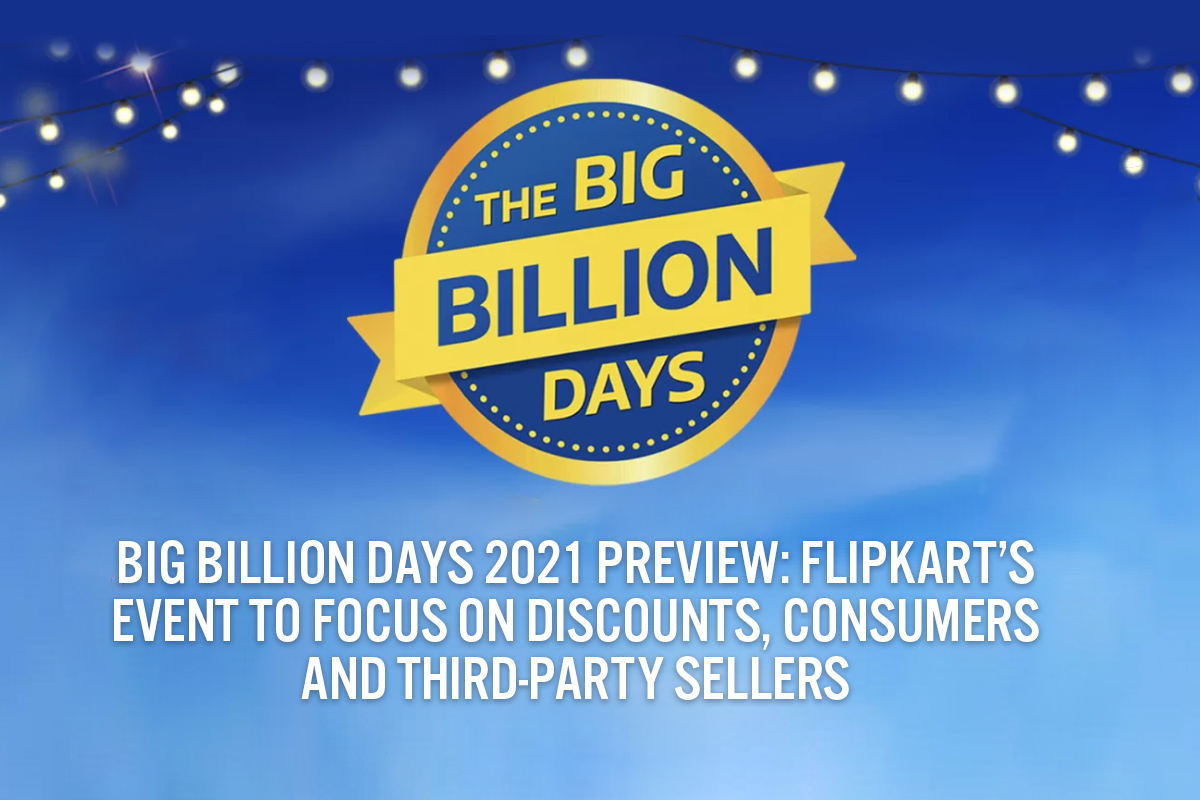
DIpil Das
What’s the Story?
India-based online marketplace Flipkart, majority owned by Walmart, announced on September 21, 2021, that its annual flagship shopping event, Big Billion Days (BBD), will take place on October 7–12, 2021. Ahead of the event, the e-commerce giant has teased big discounts and launches on its website. Members of Flipkart Plus, the company’s free-delivery and early-access membership program, will have 24-hour early access to the event before its public launch.Why It Matters
BBD usually coincides with the beginning of Hindu festivals in India, namely, Navratri and Diwali—the largest religious festivals across the country. With ongoing pandemic-related government restrictions in most states, including regulations on mass gatherings and a cap on the number of attendees permitted at public functions, people are likely to confine this year’s celebrations to their homes or small neighborhood gatherings. However, as part of the celebrations, consumers dress up and decorate their homes, so we expect to see a surge in consumer spending on categories such as apparel, footwear, appliances, home décor and personal care. Last year, BBD was primarily driven by sellers from Tier 2 and Tier 3 cities and small towns. Of the approximately 35% new sellers during BBD 2020, about 60% were from Tier 2 cities and below. Demonstrating the size and popularity of the annual festival, it served over 250 million consumers in India last year, across 20,000 zip codes. BBD 2020 also saw a 1.5X increase in the number of sellers that generated sales of over ₹10 million (around $136,100), according to Flipkart.Big Billion Days 2021: A Preview
Ahead of BBD 2021 and the upcoming festive season, Flipkart has undertaken several initiatives to broaden its reach, including launching brand partnerships, increasing its seller base and ramping up its supply chain infrastructure. The festival will offer deals, discounts and offers to shoppers across various product categories. We present four key features of BBD 2021 in Figure 1 and explore each in detail below.Figure 1. Big Billion Days 2021: Four Key Features [caption id="attachment_132991" align="aligncenter" width="725"]
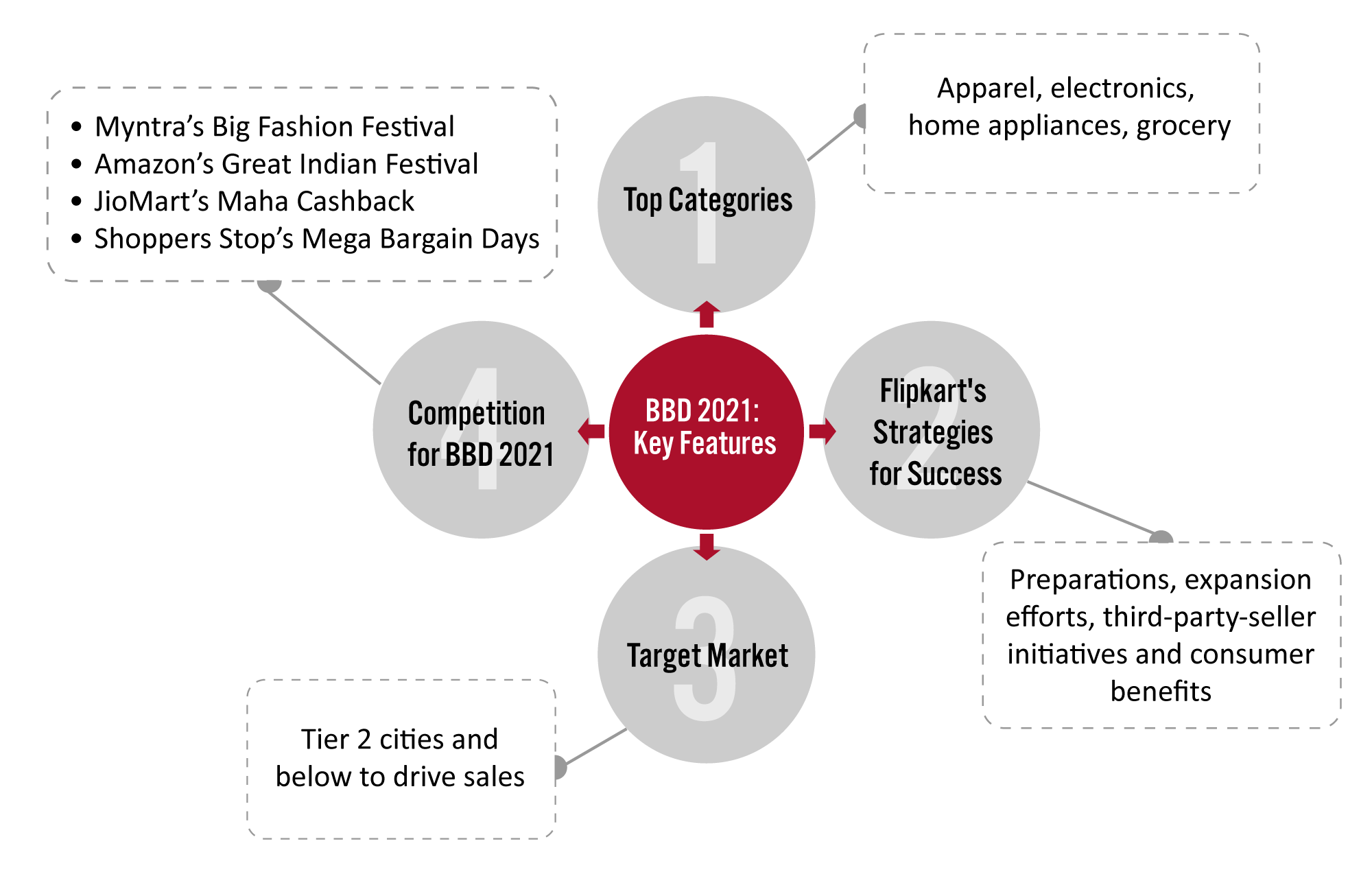 Source: Coresight Research [/caption]
1. Top Categories During BBD 2021: Apparel, Electronics, Home Appliances, Grocery
BBD 2021 will launch ahead of the festive season—a time when Indian consumers dress up for festive celebrations and are likely to spend on high-priced items—and amid pandemic-led restrictions on leisure travel, so consumers are likely to have celebrations at home. We therefore expect categories such as apparel, electronics, home appliances, groceries, home décor and personal care to witness a surge in consumer spending.
The recent 2021 Festive Season Pulse online survey, conducted by YouGov and global technology company The Trade Desk in August 2021, demonstrates consumers’ plans to spend during the upcoming festive season, with 91% of Indian consumers planning to make a purchase. The survey also revealed that apparel and accessories comprise the top category preferred by both men and women for festive-season purchases. Groceries, consumer electronics, and health and personal care also feature among the top five categories for men and women (see Figure 2).
Source: Coresight Research [/caption]
1. Top Categories During BBD 2021: Apparel, Electronics, Home Appliances, Grocery
BBD 2021 will launch ahead of the festive season—a time when Indian consumers dress up for festive celebrations and are likely to spend on high-priced items—and amid pandemic-led restrictions on leisure travel, so consumers are likely to have celebrations at home. We therefore expect categories such as apparel, electronics, home appliances, groceries, home décor and personal care to witness a surge in consumer spending.
The recent 2021 Festive Season Pulse online survey, conducted by YouGov and global technology company The Trade Desk in August 2021, demonstrates consumers’ plans to spend during the upcoming festive season, with 91% of Indian consumers planning to make a purchase. The survey also revealed that apparel and accessories comprise the top category preferred by both men and women for festive-season purchases. Groceries, consumer electronics, and health and personal care also feature among the top five categories for men and women (see Figure 2).
Figure 2. India: Top Five Categories for Festive-Season Shopping, Preferred by Men and Women (% of Respondents) [caption id="attachment_132992" align="aligncenter" width="726"]
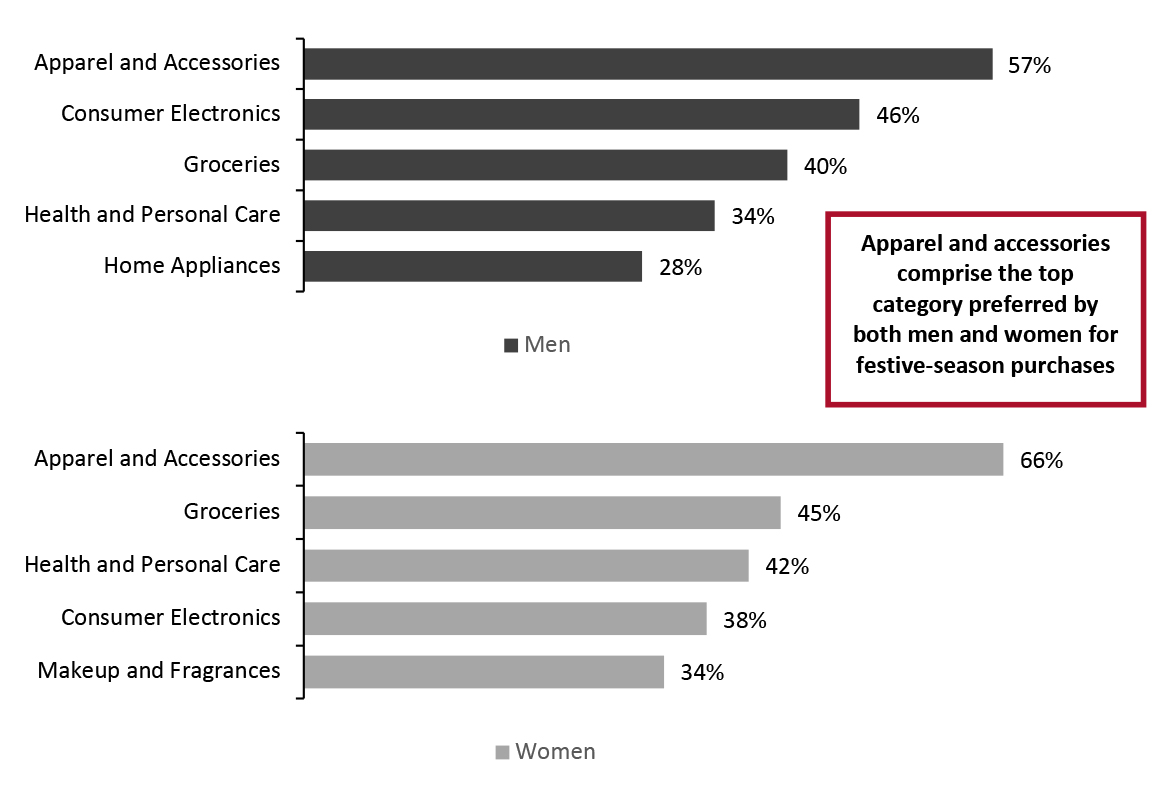 Source: The Trade Desk/YouGov [/caption]
The BBD sale in 2020 saw 2X growth in the electronics category, with products such as laptops, desktops, audio devices, cameras and tablets seeing the highest sales. Consumer willingness to spend more on high-priced items such as electronics during the 2021 festival will be augmented by heavy discounts during the festival, as we discuss later in this report.
2. Flipkart’s Strategies for Success: Preparations, Expansion Efforts, Third-Party-Seller Initiatives and Consumer Benefits
Partnership with a Global Fashion Brand
Flipkart announced on September 8, 2021, that it has partnered with emerging London-based fashion brand Urbanic to offer a wide range of fashion products to young Indian consumers, especially Gen Z, ahead of the festive season and BBD 2021. The partnership will offer a collection of around 1,000 unique styles across categories such as tops, denim, winter wear, lingerie, loungewear and swimwear to over 350 million Flipkart customers from metros to Tier 2 and Tier 3+ regions. Flipkart’s pan-India presence, including smaller towns and cities, will enable Urbanic to expand its customer base.
In its recently published report, How India Shops Online 2.0, Bain & Company states that fashion remains the key gateway category for new online shoppers, as 35%–40% of new e-commerce customers bought fashion in their first transaction in 2020. Flipkart believes that demand for fashion among young consumers in India is on the rise, and the company plans to address their needs by enhancing its youth-fashion portfolio, with the Urbanic partnership contributing to this effort.
Strengthening of the Kirana Delivery Program
Flipkart announced on September 8, 2021, that it is strengthening the Kirana Delivery Program, which first launched in 2019. The company plans to onboard about 100,000 kirana partners (neighborhood retail stores) across the country, doubling the number from last year, to deliver millions of shipments during the 2021 festive season. Flipkart plans to strengthen its last-mile network, especially to those towns and zip codes that are difficult to reach, and create opportunities for digital upskilling and additional income for kiranas, according to the company.
Flipkart has a dedicated team to train its kirana partners with the knowledge, expertise, experience and technologies to make seamless deliveries. During last year’s festive season, trained kirana partners made more than 10 million deliveries across the country, Flipkart reported. The Kirana Delivery Program currently accounts for about one-third of Flipkart’s deliveries each month, and kirana partners have registered an increase in their delivery income of nearly 30%, on average, since joining the program, according to Flipkart.
Expansion of Hyperlocal Arm, Flipkart Quick
Flipkart announced on September 9, 2021, that it has expanded its hyperlocal service, Flipkart Quick, to three new metropolitan areas— Chennai, Kolkata and Mumbai—offering consumers seamless access to order daily essentials and facilitating quick home delivery. Flipkart Quick will be available in 14 Indian cities by the end of September, ahead of the festive season, and Flipkart plans to expand the hyperlocal service to 200 cities by the end of 2022, according to the company.
Flipkart Quick leverages Ninjacart—India's largest fresh-produce supply chain company, which was acquired by Flipkart in October 2020 for $30 billion—and Flipkart’s strategic partnerships with other local vendors to build an end-to-end ecosystem that provides customers access to fruits and vegetables at value prices. The service was launched in Bengaluru in 2020 and offers an assortment of over 2,500 products across categories such as fresh fruits and vegetables, dairy, grocery, mobiles, electronics and baby care. Flipkart Quick enables consumers to receive delivery of online orders within 90 minutes or within a two-hour delivery slot, based on their convenience. The service is now live on the Flipkart Online Shopping App.
[caption id="attachment_132993" align="aligncenter" width="398"]
Source: The Trade Desk/YouGov [/caption]
The BBD sale in 2020 saw 2X growth in the electronics category, with products such as laptops, desktops, audio devices, cameras and tablets seeing the highest sales. Consumer willingness to spend more on high-priced items such as electronics during the 2021 festival will be augmented by heavy discounts during the festival, as we discuss later in this report.
2. Flipkart’s Strategies for Success: Preparations, Expansion Efforts, Third-Party-Seller Initiatives and Consumer Benefits
Partnership with a Global Fashion Brand
Flipkart announced on September 8, 2021, that it has partnered with emerging London-based fashion brand Urbanic to offer a wide range of fashion products to young Indian consumers, especially Gen Z, ahead of the festive season and BBD 2021. The partnership will offer a collection of around 1,000 unique styles across categories such as tops, denim, winter wear, lingerie, loungewear and swimwear to over 350 million Flipkart customers from metros to Tier 2 and Tier 3+ regions. Flipkart’s pan-India presence, including smaller towns and cities, will enable Urbanic to expand its customer base.
In its recently published report, How India Shops Online 2.0, Bain & Company states that fashion remains the key gateway category for new online shoppers, as 35%–40% of new e-commerce customers bought fashion in their first transaction in 2020. Flipkart believes that demand for fashion among young consumers in India is on the rise, and the company plans to address their needs by enhancing its youth-fashion portfolio, with the Urbanic partnership contributing to this effort.
Strengthening of the Kirana Delivery Program
Flipkart announced on September 8, 2021, that it is strengthening the Kirana Delivery Program, which first launched in 2019. The company plans to onboard about 100,000 kirana partners (neighborhood retail stores) across the country, doubling the number from last year, to deliver millions of shipments during the 2021 festive season. Flipkart plans to strengthen its last-mile network, especially to those towns and zip codes that are difficult to reach, and create opportunities for digital upskilling and additional income for kiranas, according to the company.
Flipkart has a dedicated team to train its kirana partners with the knowledge, expertise, experience and technologies to make seamless deliveries. During last year’s festive season, trained kirana partners made more than 10 million deliveries across the country, Flipkart reported. The Kirana Delivery Program currently accounts for about one-third of Flipkart’s deliveries each month, and kirana partners have registered an increase in their delivery income of nearly 30%, on average, since joining the program, according to Flipkart.
Expansion of Hyperlocal Arm, Flipkart Quick
Flipkart announced on September 9, 2021, that it has expanded its hyperlocal service, Flipkart Quick, to three new metropolitan areas— Chennai, Kolkata and Mumbai—offering consumers seamless access to order daily essentials and facilitating quick home delivery. Flipkart Quick will be available in 14 Indian cities by the end of September, ahead of the festive season, and Flipkart plans to expand the hyperlocal service to 200 cities by the end of 2022, according to the company.
Flipkart Quick leverages Ninjacart—India's largest fresh-produce supply chain company, which was acquired by Flipkart in October 2020 for $30 billion—and Flipkart’s strategic partnerships with other local vendors to build an end-to-end ecosystem that provides customers access to fruits and vegetables at value prices. The service was launched in Bengaluru in 2020 and offers an assortment of over 2,500 products across categories such as fresh fruits and vegetables, dairy, grocery, mobiles, electronics and baby care. Flipkart Quick enables consumers to receive delivery of online orders within 90 minutes or within a two-hour delivery slot, based on their convenience. The service is now live on the Flipkart Online Shopping App.
[caption id="attachment_132993" align="aligncenter" width="398"]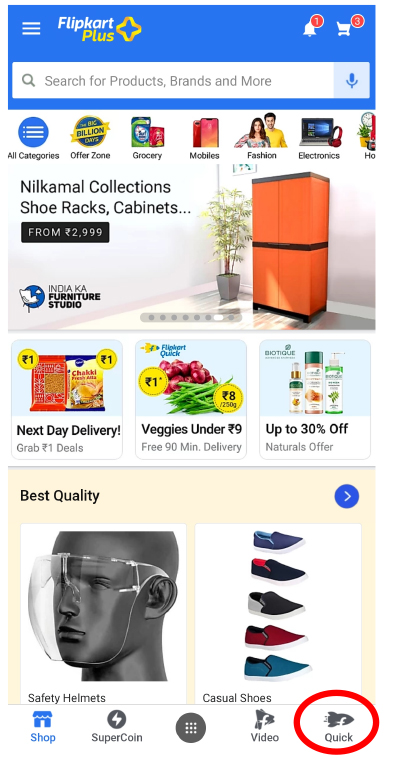 Source: Flipkart Online Shopping App[/caption]
Ramping Up of Supply Chain Infrastructure: 66 New Fulfillment and Sortation Centers
In a press release dated September 15, 2021, Flipkart announced the expansion of its supply chain network across India in the run-up to the festive season, with the addition of 66 new fulfillment and sortation facilities, covering 10 million square feet and with around 20 million cubic feet of storage space. These fulfillment centers will help tens of thousands of sellers, micro-, small and medium enterprises (MSMEs), artisans and kiranas to cater to growing consumer demand for quality products and fast delivery.
The move comes as part of Flipkart’s investments in capacity, storage, sorting, packaging, human resources, training and delivery—scaling up the supply chain and ensuring the seamless movement of shipments across the country during the festive season. Flipkart has expanded its last-mile reach by adding more than 1,000 new delivery hubs across India, and it is working with many third-party logistics partners to speed up delivery. Flipkart is also creating direct seasonal employment for over 115,000 people this year, of which 15% will be women and people who are differently abled, according to the company.
We summarize Flipkart’s other supply chain expansion efforts in the figure below. Flipkart believes that its investments during this festive season will further help sellers revive their businesses and strengthen their economic recovery from the impacts of the Covid-19 pandemic.
Source: Flipkart Online Shopping App[/caption]
Ramping Up of Supply Chain Infrastructure: 66 New Fulfillment and Sortation Centers
In a press release dated September 15, 2021, Flipkart announced the expansion of its supply chain network across India in the run-up to the festive season, with the addition of 66 new fulfillment and sortation facilities, covering 10 million square feet and with around 20 million cubic feet of storage space. These fulfillment centers will help tens of thousands of sellers, micro-, small and medium enterprises (MSMEs), artisans and kiranas to cater to growing consumer demand for quality products and fast delivery.
The move comes as part of Flipkart’s investments in capacity, storage, sorting, packaging, human resources, training and delivery—scaling up the supply chain and ensuring the seamless movement of shipments across the country during the festive season. Flipkart has expanded its last-mile reach by adding more than 1,000 new delivery hubs across India, and it is working with many third-party logistics partners to speed up delivery. Flipkart is also creating direct seasonal employment for over 115,000 people this year, of which 15% will be women and people who are differently abled, according to the company.
We summarize Flipkart’s other supply chain expansion efforts in the figure below. Flipkart believes that its investments during this festive season will further help sellers revive their businesses and strengthen their economic recovery from the impacts of the Covid-19 pandemic.
Figure 3. Flipkart’s Key Supply Chain Expansion Efforts Ahead of the 2021 Festive Season in India [caption id="attachment_132994" align="aligncenter" width="724"]
 Source: Company reports/Coresight Research[/caption]
Onboarding of More Sellers Ahead of Festive Season Sales
Flipkart continues to strengthen its seller base, with plans to add 120,000 sellers to its platform by December 2021, working toward 420,000 in total. On September 16, 2021, the e-commerce giant said that it had already onboarded 75,000 sellers and MSMEs over the last few months. Its seller base is primarily located in Tier 2 and Tier 3 markets.
Flipkart has also launched a next-day payment program that allows sellers to receive their order payments within a day. Furthermore, as part of its Growth Capital seller financing program, the company is helping sellers with customized offerings from lenders to provide necessary financial aid for the festive season, including for BBD 2021. Flipkart has also hosted a training program to its seller base to provide them with best practices to boost festive sales.
Extension of Credit Limit to Consumers: Buy-Now-Pay-Later Facility
Flipkart’s buy-now-pay-later offering, “Flipkart Pay Later,” has extended the credit limit to ₹70,000 ($951.50) from its earlier limit of ₹10,000 ($135.90), the company announced on September 14, 2021. The increase is intended to drive affordability and convenience of purchases on the Flipkart platform during the festive season. Customers using this option during checkout can pay back the amount incurred for the purchase over flexible tenures of three, six, nine and 12 months. While over 100 million pre-approved consumers already have access to this product, Flipkart plans to extend this offering to all consumers; they can apply by providing proof of ID and bank account details.
Flipkart plans to offer zero-cost EMIs (equated monthly installments)—fixed payments made by the customer to the seller on a specified date of each month—as well as standard EMIs, in partnership with 18 leading banks and financial institutions in India.
Offers and Promotions
Flipkart is providing several attractive deals, discounts and offers to encourage shoppers to shop during the BBD festival:
Source: Company reports/Coresight Research[/caption]
Onboarding of More Sellers Ahead of Festive Season Sales
Flipkart continues to strengthen its seller base, with plans to add 120,000 sellers to its platform by December 2021, working toward 420,000 in total. On September 16, 2021, the e-commerce giant said that it had already onboarded 75,000 sellers and MSMEs over the last few months. Its seller base is primarily located in Tier 2 and Tier 3 markets.
Flipkart has also launched a next-day payment program that allows sellers to receive their order payments within a day. Furthermore, as part of its Growth Capital seller financing program, the company is helping sellers with customized offerings from lenders to provide necessary financial aid for the festive season, including for BBD 2021. Flipkart has also hosted a training program to its seller base to provide them with best practices to boost festive sales.
Extension of Credit Limit to Consumers: Buy-Now-Pay-Later Facility
Flipkart’s buy-now-pay-later offering, “Flipkart Pay Later,” has extended the credit limit to ₹70,000 ($951.50) from its earlier limit of ₹10,000 ($135.90), the company announced on September 14, 2021. The increase is intended to drive affordability and convenience of purchases on the Flipkart platform during the festive season. Customers using this option during checkout can pay back the amount incurred for the purchase over flexible tenures of three, six, nine and 12 months. While over 100 million pre-approved consumers already have access to this product, Flipkart plans to extend this offering to all consumers; they can apply by providing proof of ID and bank account details.
Flipkart plans to offer zero-cost EMIs (equated monthly installments)—fixed payments made by the customer to the seller on a specified date of each month—as well as standard EMIs, in partnership with 18 leading banks and financial institutions in India.
Offers and Promotions
Flipkart is providing several attractive deals, discounts and offers to encourage shoppers to shop during the BBD festival:
- 80% discounts on electronics and accessories such as healthcare devices, power banks, smart wearables, headphones and speakers
- 80% discounts on televisions and home appliances
- 60%–80% discounts on clothing, footwear, bags and luggage
- Home and kitchen, beauty, toys and food categories will offer products starting from ₹99 ($1.35).
- 85% discounts on furniture and mattresses
- 80% discounts on Flipkart brands
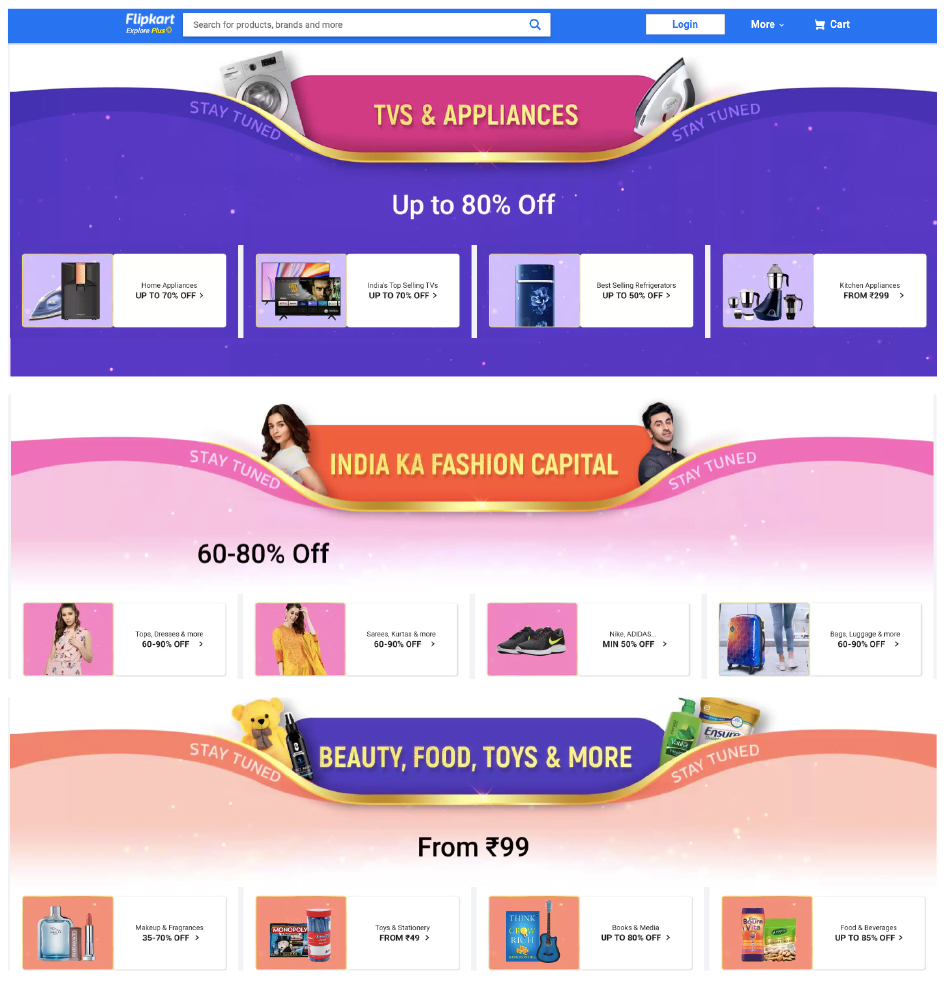 Source: Flipkart.com[/caption]
Source: Flipkart.com[/caption]
- 70% discounts in certain categories and up to 10% further savings when consumers buy multiples of the same product
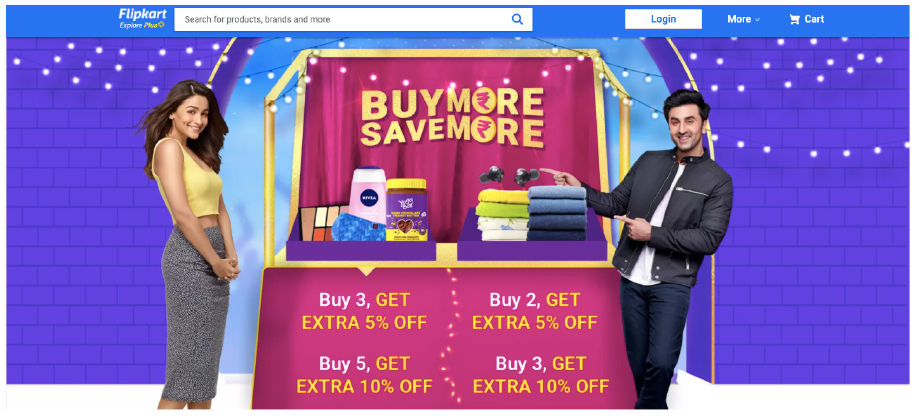 Source: Flipkart.com[/caption]
Source: Flipkart.com[/caption]
- “Crazy Deals” at regular eight-hour intervals, in addition to rush-hour deals and flash sales
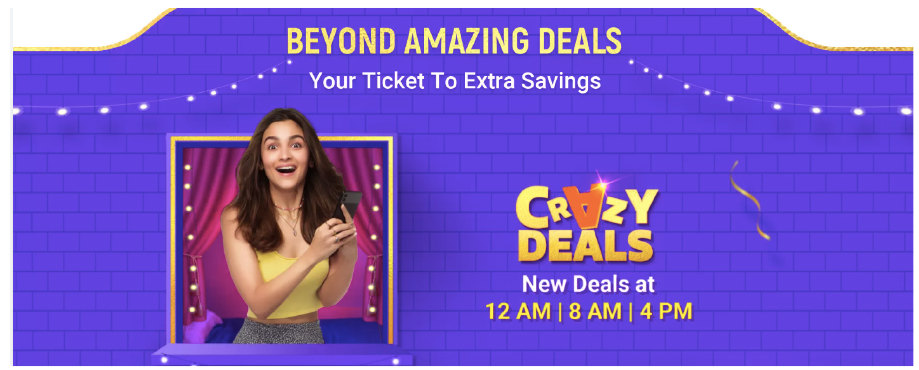 Source: Flipkart.com[/caption]
Partnerships with Banks and Fintech Firms
Flipkart has partnered with India’s leading banks, such as ICICI Bank and Axis Bank, to offer an instant 10% discount to customers using certain credit and debit cards to make BBD purchases. Like last year, the e-commerce giant has also partnered with payments app Paytm to allow users to pay through the Paytm app for their BBD purchases and get assured cashback on orders.
3. Target Market: Tier 2 Cities and Below To Drive Sales
Smaller Indian cities are increasingly accounting for a larger proportion of the country’s e-commerce sales. Invest India, the national investment promotion and facilitation agency, estimates that Tier 2 cities, Tier 3 cities and smaller towns account for nearly half of all shoppers and contribute for three in five orders for leading e-commerce platforms.
Flipkart saw new user growth of nearly 50%, with Tier 3+ cities posting the highest growth of 65%, during July–September 2020, according to the company. Flipkart also saw a 35% increase in new sellers in 2020 compared to 2019, mainly from Tier 2 and Tier 3 cities. On September 16, 2021, the e-commerce company stated that its seller base primarily comes from Tier 2 and Tier 3 markets.
Increased adoption and acceptance of digital payments such as unified payments interface (UPI) and digital wallets—including Google Pay, Paytm and PhonePe—in Tier 2, Tier 3 and rural markets will likely drive sales during BBD 2021. The figure below presents the preferred modes of payment among Indian consumers during the festive season from 2018 to 2020, showing that digital payments registered huge growth last year.
Source: Flipkart.com[/caption]
Partnerships with Banks and Fintech Firms
Flipkart has partnered with India’s leading banks, such as ICICI Bank and Axis Bank, to offer an instant 10% discount to customers using certain credit and debit cards to make BBD purchases. Like last year, the e-commerce giant has also partnered with payments app Paytm to allow users to pay through the Paytm app for their BBD purchases and get assured cashback on orders.
3. Target Market: Tier 2 Cities and Below To Drive Sales
Smaller Indian cities are increasingly accounting for a larger proportion of the country’s e-commerce sales. Invest India, the national investment promotion and facilitation agency, estimates that Tier 2 cities, Tier 3 cities and smaller towns account for nearly half of all shoppers and contribute for three in five orders for leading e-commerce platforms.
Flipkart saw new user growth of nearly 50%, with Tier 3+ cities posting the highest growth of 65%, during July–September 2020, according to the company. Flipkart also saw a 35% increase in new sellers in 2020 compared to 2019, mainly from Tier 2 and Tier 3 cities. On September 16, 2021, the e-commerce company stated that its seller base primarily comes from Tier 2 and Tier 3 markets.
Increased adoption and acceptance of digital payments such as unified payments interface (UPI) and digital wallets—including Google Pay, Paytm and PhonePe—in Tier 2, Tier 3 and rural markets will likely drive sales during BBD 2021. The figure below presents the preferred modes of payment among Indian consumers during the festive season from 2018 to 2020, showing that digital payments registered huge growth last year.
Figure 4. India: Preferred Mode of Payment for E-Commerce During Festive Season–2018–2020 [caption id="attachment_132998" align="aligncenter" width="726"]
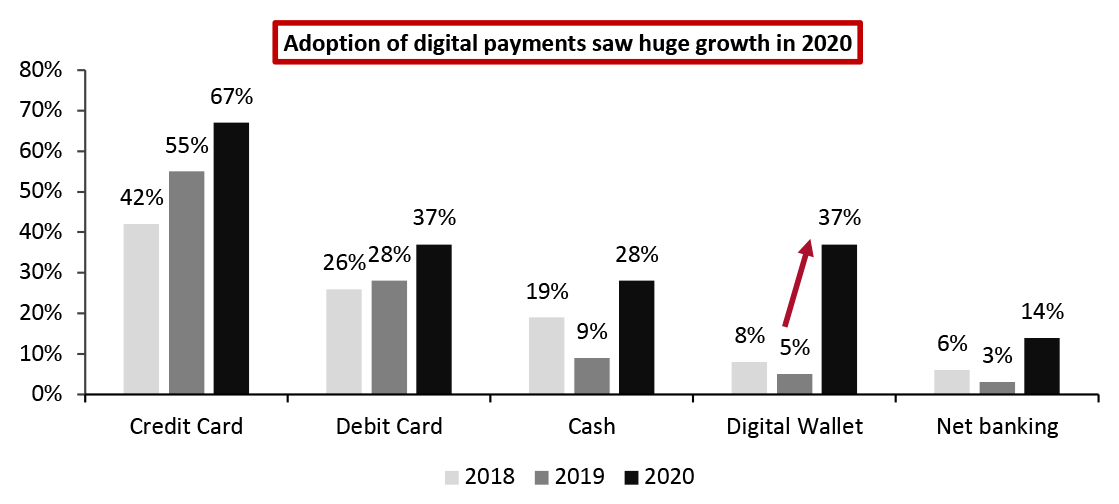 Source: Retailers Association of India/LitmusWorld[/caption]
4. Competition for BBD 2021
Flipkart’s fashion platform, Myntra, has announced that its “Big Fashion Festival” will launch soon and is currently displaying a teaser on its website. Myntra describes the event as the biggest sale of the year and promises 50%–80% discounts across many brands and categories. Some of the deals include flat 80% discount on over 40,000 styles; buy one, get four free; buy one and get a second item for an extra ₹1 ($0.01); and everyday limited-time deals between 12.00 p.m. and 4.00 p.m. during the sale period.
Myntra will also offer a 10% instant discount on purchases made using ICICI Bank and Kotak Bank credit and debit cards. Furthermore, the platform will offer free shipping during the entire festive period.
[caption id="attachment_132999" align="aligncenter" width="726"]
Source: Retailers Association of India/LitmusWorld[/caption]
4. Competition for BBD 2021
Flipkart’s fashion platform, Myntra, has announced that its “Big Fashion Festival” will launch soon and is currently displaying a teaser on its website. Myntra describes the event as the biggest sale of the year and promises 50%–80% discounts across many brands and categories. Some of the deals include flat 80% discount on over 40,000 styles; buy one, get four free; buy one and get a second item for an extra ₹1 ($0.01); and everyday limited-time deals between 12.00 p.m. and 4.00 p.m. during the sale period.
Myntra will also offer a 10% instant discount on purchases made using ICICI Bank and Kotak Bank credit and debit cards. Furthermore, the platform will offer free shipping during the entire festive period.
[caption id="attachment_132999" align="aligncenter" width="726"]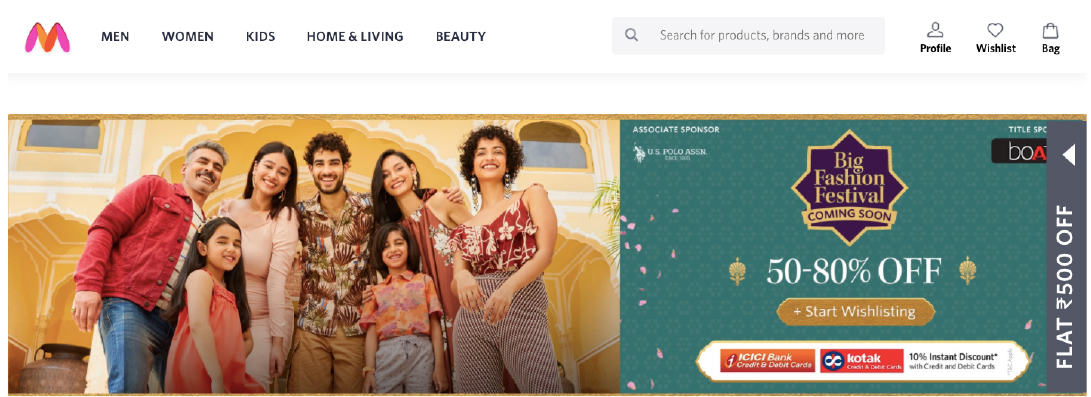 Source: Myntra.com[/caption]
Amazon’s flagship sale event, “Great Indian Festival (GIF) 2021,” will likely launch during the festive season in October 2021. The e-commerce giant is yet to confirm the dates but has posted a teaser of the upcoming sale on its website and app. Like last year, the sale will begin early for Prime members.
Amazon has partnered with HDFC Bank to offer a 10% instant discount on purchases made through select credit and debit cards. The teaser also reveals that there will be exchange offers of up to ₹25,000 (around $340) during the GIF sale period. While Amazon has not yet revealed all the deals, offers include 40% discounts on Amazon products such as Echo, Kindle and Fire TV; home and kitchen products starting ₹79 (around $1.00); electronics and accessories at “rock-bottom prices;” and exclusive launches in categories such as smartphones, laptops, smart TVs and more.
[caption id="attachment_133001" align="aligncenter" width="723"]
Source: Myntra.com[/caption]
Amazon’s flagship sale event, “Great Indian Festival (GIF) 2021,” will likely launch during the festive season in October 2021. The e-commerce giant is yet to confirm the dates but has posted a teaser of the upcoming sale on its website and app. Like last year, the sale will begin early for Prime members.
Amazon has partnered with HDFC Bank to offer a 10% instant discount on purchases made through select credit and debit cards. The teaser also reveals that there will be exchange offers of up to ₹25,000 (around $340) during the GIF sale period. While Amazon has not yet revealed all the deals, offers include 40% discounts on Amazon products such as Echo, Kindle and Fire TV; home and kitchen products starting ₹79 (around $1.00); electronics and accessories at “rock-bottom prices;” and exclusive launches in categories such as smartphones, laptops, smart TVs and more.
[caption id="attachment_133001" align="aligncenter" width="723"] Source: Amazon.in[/caption]
Reliance Retail’s online grocery banner JioMart is offering a “Maha Cashback” offer of 10%–30% cashback on purchases made in any of Reliance Retail’s offline store formats (Reliance Fresh, Reliance Digital, Reliance Smart) or online platforms (Reliance Trends, Ajio, etc.) between September 18 and September 29, 2021. The cashback earned can be redeemed on further purchases above ₹200 ($2.70) in these stores from October 2, 2021.
JioMart is currently offering 50% discounts on more than 6,000 grocery, personal care, home care, home and kitchen, and mom and baby care products on its website. The platform is also offering discounts in fashion under casualwear and ethnic-wear categories.
Department store retailer Shoppers Stop is offering up to 70% discounts on favorite brands, 50% discounts on dresses, 30% discounts on watches, 15% discounts on kitchen appliances and up to 50% discounts on makeup and fragrances, as part of its “Mega Bargain Days” offer between September 17 and September 23, 2021.
Source: Amazon.in[/caption]
Reliance Retail’s online grocery banner JioMart is offering a “Maha Cashback” offer of 10%–30% cashback on purchases made in any of Reliance Retail’s offline store formats (Reliance Fresh, Reliance Digital, Reliance Smart) or online platforms (Reliance Trends, Ajio, etc.) between September 18 and September 29, 2021. The cashback earned can be redeemed on further purchases above ₹200 ($2.70) in these stores from October 2, 2021.
JioMart is currently offering 50% discounts on more than 6,000 grocery, personal care, home care, home and kitchen, and mom and baby care products on its website. The platform is also offering discounts in fashion under casualwear and ethnic-wear categories.
Department store retailer Shoppers Stop is offering up to 70% discounts on favorite brands, 50% discounts on dresses, 30% discounts on watches, 15% discounts on kitchen appliances and up to 50% discounts on makeup and fragrances, as part of its “Mega Bargain Days” offer between September 17 and September 23, 2021.
What We Think
With events such as Flipkart’s BBD and Amazon’s GIF taking place annually and driving other e-commerce players to offer deals, discounts and offers, consumers anticipate such events and plan to spend big in the run-up to the festive season each year. We also expect to see a surge in festive shopping this year due to increased convenience and safe shopping offerings. Increased Internet penetration and smartphone adoption, coupled with a surge in pandemic-led digital payment adoption, will further accelerate consumer spending during BBD 2021, especially in Tier 2 and Tier 3 cities and smaller towns in India. For sellers, BBD 2021 offers economic relief from the impacts of the second wave of the pandemic, along with opportunities to enhance their digital business. Shopping festivals enable e-commerce players to expand their base of sellers and consumers ahead of the festive season. Implications for Brands/Retailers- E-commerce majors Flipkart and Amazon are onboarding sellers and MSMEs as part of their shopping festivals, empowering them and offering necessary support to build an online presence. Brands and retailers should leverage this opportunity to create an online storefront and offer attractive features to engage and retain online customers.
- Strategic partnerships with e-commerce players amid the festive season enable brands and retailers to expand their business to a reach a wider customer base, particularly Tier 2 and below markets, as well as boost regular business through online sales and events.
- Shopping festivals usually witness a huge spike in sales, leading to shipment delays. Technology providers in the last-mile delivery space should partner with e-commerce players to capitalize on the need to upgrade existing systems to meet the spike in order fulfillment.
- Companies offering tech-powered supply chain solutions can help e-commerce players anticipate festive-season demand and streamline their operations and supply chain.